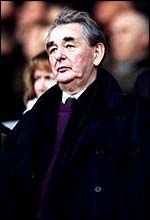Brian Clough, 1935-2004
“I want no epitaphs of profound history and all that type of thing. I contributed – I would hope they would say that, and I would hope somebody liked me.”
– Brian Clough OBE, MA
 Brian Clough will be remembered as one of the all-time greats, not just by fans of the clubs he impacted upon, but throughout the world of football. His achievements as both manager and player still stand today as some of the most outstanding in the history of the game and his personality will forever be imprinted on the histories of Nottingham Forest and Derby County.
Brian Clough will be remembered as one of the all-time greats, not just by fans of the clubs he impacted upon, but throughout the world of football. His achievements as both manager and player still stand today as some of the most outstanding in the history of the game and his personality will forever be imprinted on the histories of Nottingham Forest and Derby County.
Brian was born into a large family on March 21, 1935, in Grove Hill, Middlesbrough. After leaving school he worked at ICI and joined a local amateur football side. It wasn’t long before his natural talents were spotted, and at the age of just 17 he signed for his boyhood team. He made his ‘Boro debut in September 1955 when injuries to other players gave him his chance.
He made the most of the opportunity, quickly establishing himself with an incredible scoring record – he scored 204 goals in just 213 games, over a five-year period. In 1961, he moved to Sunderland where he continued to score freely. However, his career was ended suddenly when was injured in a horrific collision with a goalkeeper on Boxing Day 1963 – he was aged just 28.
After being forced into retirement so young, Clough turned to management. Feeling he still had something to prove and with the help of his former team-mate Peter Taylor, he took the helm at Hartlepool United. After helping the club from bottom of the Fourth Division to a credible eighth place on a drastically limited budget, the pair were offered a step up to take over at Derby County. They transformed the small Midlands club, taking them into the First Division in 1969. Two years later Clough and Taylor had built a side ready to challenge for the championship, giving Derby their first league title in 1972.
The following season Clough guided the Rams to the semi-final of the European Cup, but after a dispute with their chairman, he and Taylor resigned. They moved to Brighton for one season, and then Brian was drafted in to replace Don Revie at Leeds United. Sadly, Clough’s maverick methods of coaching did not go down well with the Leeds players and he left the club after only 44 days.
With his reputation seriously damaged, there were few offers of work for Brian. However, Second Division side Nottingham Forest took a gamble and made him manager in January 1975 – he then began one of the biggest turn-arounds in football history.
Brian steered the side clear of relegation that year and signed a host of players who would later become heroes themselves. After a year of consolidation (during which he was joined once again by Peter Taylor), the 1976/77 season saw Forest win promotion in the final game. Few would have expected the Reds to even avoid relegation in Division One, but Clough’s side took the entire league by storm. By the end of the year, Forest were challenging for the title and smashed Liverpool’s dominance by securing their first and only League Championship.
By now Cloughie was once again one of the hottest properties in management, but he stayed with Forest and turned them into one of the most formidable sides in European football. The Reds were crowned European Champions at the end of the 1979 campaign and then went on to retain the title – making them only the second British club to do so.
In his 18-year spell with Forest, Clough brought many trophies to the City Ground, but the one honour that evaded him was the FA Cup, losing to Tottenham in 1991. Another regret he always had was that he never got the chance to manage England – the FA always considered him too much of a liability to take the top job.
His outspoken nature meant that controversy always followed him, but he continued to produce results on the pitch until 1993 when Forest were relegated in his retirement year. Ill health dogged his retirement – he spent much of his later life battling alcoholism and in 2003 he underwent a liver transplant. However, he remained a popular figure throughout the game and, never afraid to speak his mind, always had a few opinions to convey about the latest developments in the sport.
His family thanked the staff at Derby City hospital and the family of the organ donor for allowing him a further 21 months of “health and happiness”. He passed away peacefully with his family by his bed-side on September 20, 2004 at the age of 69. He died of stomach cancer.
Clough was never under any illusion about his talents. He once famously said: “I wouldn’t say I was the best manager in the business. But I was in the top one.” As the tributes flow in to celebrate the life of one of football’s best-loved, unique characters, few would disagree that his achievements set him apart as the best manager in English football history. He will be sorely missed by all in the game.

 More Forest History
More Forest History